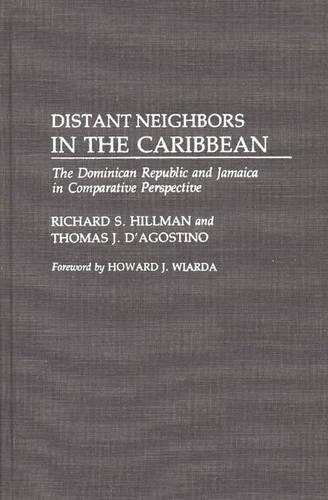
Distant Neighbors in the Caribbean: The Dominican Republic and Jamaica in Comparative Perspective
(Hardback)
Publishing Details
Distant Neighbors in the Caribbean: The Dominican Republic and Jamaica in Comparative Perspective
By (Author) Richard S. Hillman
Bloomsbury Publishing PLC
Praeger Publishers Inc
20th May 1992
United States
Classifications
Tertiary Education
Non Fiction
327.729
Physical Properties
Hardback
224
Description
This study in comparative politics provides a comparison and contrast in the political development of two countries with divergent historical influences - the Dominican Republic and Jamaica. Although situated in close geographical proximity to each other and to the United States, Jamaica and the Dominican Republic are island nations generally considered separately in the fields of Latin American and Commonwealth Caribbean politics. The mutually exclusive treatment of Caribbean countries with Hispanic traditions and those with British traditions is common in the literature and may be attributed to increased specialization, misunderstanding, and inattention to important commonalities between the cultures. This work pulls together the common themes and patterns, developing a single framework for analyzing patterns in colonial legacies, the gaining of independence, formation of political institutions, the emergence of political leadership, and the creation and implementation of policies in the two states. The background and contemporary developments of both the Dominican Republic and Jamaica are treated within the context of this framework. This work should prove of interest to scholars in Caribbean studies, Latin American studies, comparative and international politics, and sociologists specializing in comparative cultures.
Reviews
"This is a very well written and analytically sophisticated book. Specifically, it wrestles with the complex issue of how and why distinct traditions have nevertheless produced similar developmental outcomes. . . . What is nicely done in this book . . . is not just a methodological breakthrough and a superb analysis of two political systems, but a clear-eyed vision of the future as well."-Howard J. Wiarda Professor of Political Science University of Massachusetts/Amherst --from the Foreword
An interesting, informative, readable, and important book. By looking carefully at the separate historical traditions of the Dominican Republic and Jamaica (authoritarian versus democratic), the institutions and process of government (presidential versus parliamentary), the internal and external milieu in which politics operates, the competitive constituents within each state, and the ways in which political performance has been judged locally, Hillman and D'Agostino persuasively conclude that "regimes in both countries exhibit characteristics that are neither strictly authoritarian nor truly democratic. While Dominican leaders have struggled to realize democratic ideals within a history of anarchy and authoritarianism, Jamaican democracy has been challenged by inherent authoritarian impulses." The bibliography is excellent, and the major generalizations appear valid for small, resource-scarce states anywhere. All levels.-Choice
This is an interesting book, written with the innovative intent to draw out important similarities between the political systems of two neighboring countries which have traditionally been put in very different categories because of their widely differing political heritage....The authors help us to see many important similarities that have mostly been overlooked and they make a compelling case for the fruitfulness of systematic comparative research on Caribbean countries across the boundaries of language and culture.-Caribbean Studies Newsletter
"This is an interesting book, written with the innovative intent to draw out important similarities between the political systems of two neighboring countries which have traditionally been put in very different categories because of their widely differing political heritage....The authors help us to see many important similarities that have mostly been overlooked and they make a compelling case for the fruitfulness of systematic comparative research on Caribbean countries across the boundaries of language and culture."-Caribbean Studies Newsletter
"An interesting, informative, readable, and important book. By looking carefully at the separate historical traditions of the Dominican Republic and Jamaica (authoritarian versus democratic), the institutions and process of government (presidential versus parliamentary), the internal and external milieu in which politics operates, the competitive constituents within each state, and the ways in which political performance has been judged locally, Hillman and D'Agostino persuasively conclude that "regimes in both countries exhibit characteristics that are neither strictly authoritarian nor truly democratic. While Dominican leaders have struggled to realize democratic ideals within a history of anarchy and authoritarianism, Jamaican democracy has been challenged by inherent authoritarian impulses." The bibliography is excellent, and the major generalizations appear valid for small, resource-scarce states anywhere. All levels."-Choice
Author Bio
RICHARD S. HILLMAN is Professor and Chair in the Department of Political Science at St. John Fisher College in New York. He has been a Fulbright Scholar at the Central University of Venezuela, a lecturer at the Foreign Service Institute, U.S. Department of State, and a Latin American Teaching Fellow of the Fletcher School, Tufts University, assigned to the Getuilio Vargas Foundation in Brazil. THOMAS J. D'AGOSTINO is Assistant Professor of Political Science at Siena College in New York.
